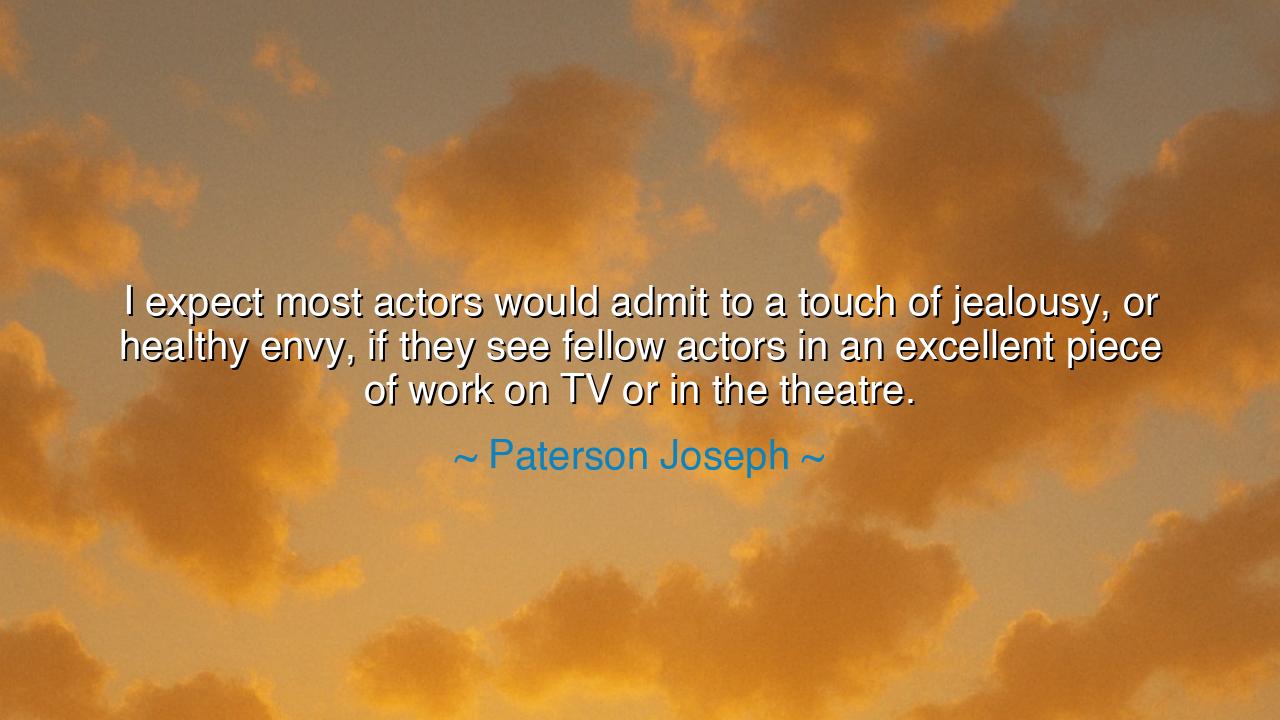
I expect most actors would admit to a touch of jealousy, or
I expect most actors would admit to a touch of jealousy, or healthy envy, if they see fellow actors in an excellent piece of work on TV or in the theatre.






In the honest and reflective words of Paterson Joseph, “I expect most actors would admit to a touch of jealousy, or healthy envy, if they see fellow actors in an excellent piece of work on TV or in the theatre.” These words strike not only at the heart of the actor’s craft, but at the very nature of the human soul. For in them lies the eternal struggle between admiration and envy, between the desire to celebrate another’s greatness and the silent ache of wishing it were one’s own. Yet Paterson Joseph, a man of deep insight and artistry, does not condemn this feeling — he redeems it. He reminds us that such envy, when rightly directed, can be healthy, even noble — a fire that burns not to destroy, but to inspire.
The origin of this quote comes from Joseph’s own experience in the world of acting — a realm where comparison is constant, where success and failure are public, and where every artist’s heart longs to be seen, understood, and remembered. As a performer of both stage and screen, Joseph has stood among giants and apprentices alike, and he knows the truth that many deny: that the artist’s heart is tender. It yearns not only to create, but to matter. To see another actor shine, to watch a performance of brilliance, stirs the same longing that drives one’s own pursuit of excellence. Thus, jealousy, when purified of malice, becomes the shadow of admiration — proof that one’s spirit still burns with desire to achieve.
In the ancient world, the Greeks called this phthonos, a complex blend of envy and emulation. The philosopher Aristotle wrote that envy could either corrupt the soul or awaken it, depending on its purpose. When a man sees another excel and burns with resentment, his envy becomes poison; but when he sees greatness and burns to equal it, that same envy becomes virtue — the beginning of discipline, creativity, and growth. So too in Joseph’s words do we find this wisdom: that the artist who feels healthy envy is not diminished by it, but sharpened. It is the dull heart that feels nothing when confronted with brilliance; the living heart trembles, yearns, and strives to rise.
Consider, then, the story of Michelangelo and Leonardo da Vinci, two titans of the Renaissance. Each looked upon the other’s work with awe and envy, each spurred by the other’s genius to surpass himself. When Leonardo painted The Last Supper, Michelangelo, moved by both admiration and rivalry, answered with the creation of the David and the Sistine Chapel ceiling. Their mutual envy did not divide them — it elevated them, and through their striving, the world inherited works of eternal beauty. Thus we see that jealousy, when guided by purpose and humility, is not a sin but a spark — the divine tension that drives humanity to greater heights.
For in every craft, not only in acting, the same truth applies. The musician who hears a song more beautiful than her own, the writer who reads a story that stirs his very bones, the teacher who watches another inspire — all feel that flicker of envy. Yet it is in how they answer that feeling that their destiny is written. The unwise grow bitter and turn inward; the wise take up the challenge and work harder. This is what Joseph calls healthy envy — a recognition of excellence not as a threat, but as a mirror reflecting what one might yet become.
The heart of Joseph’s message, then, is not about competition, but aspiration. He reveals that true admiration for another’s work is inseparable from a desire to achieve one’s own best. Envy, stripped of bitterness and shaped by humility, becomes a teacher. It whispers: “You, too, are capable. You, too, may rise.” It reminds us that greatness is not a fixed possession of a few, but a flame that passes from soul to soul, igniting all who have the courage to seek it.
The lesson here is as profound as it is practical: do not flee from envy — refine it. When you see excellence in another, do not let your heart harden with resentment. Instead, let it awaken your passion, your discipline, your longing to create something equally beautiful in your own way. Praise those who shine, for in their light you will find your path. Seek always to turn emotion into effort, comparison into creation, and jealousy into joyful striving.
So let us remember the words of Paterson Joseph as both confession and counsel: that to feel jealousy is human, but to transform it into inspiration is divine. The artist, the thinker, the dreamer — all are bound by this sacred fire. Do not extinguish it with bitterness; feed it with admiration and courage. For the greatness you behold in others is not meant to shame you, but to summon you — to call forth the hidden brilliance waiting within your own soul.






AAdministratorAdministrator
Welcome, honored guests. Please leave a comment, we will respond soon